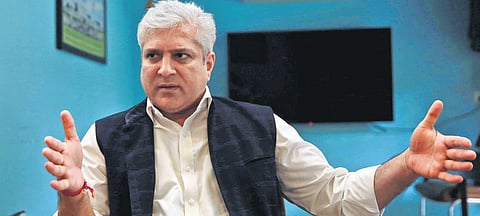

In an interview to The Sunday Standard, Transport Minister Kailash Gahlot said the Delhi government is going big to switch the entire fleet of buses under the public transport system to electric. It is a big task but the Kejriwal government is putting all efforts to make the city pollution-free, he asserted. Excerpts.
How do you plan to make Delhi the e-vehicle capital of India?
The government is making sincere efforts to make Delhi the electric vehicle as well as green capital of India, with an aim to make the city pollution-free. While shifting towards green mobility, the transport department has decided to increase the participation of women in our bus fleet. As a first step, it launched an online registration of e-auto permits with 33 per cent reservation for women. The government wants to empower women to join the DTC fleet and start their career as drivers. There is also a provision in the EV policy that every electric bus will have woman drivers. In future, we may also mandate that all e-buses should have women drivers.
But recently some aspirants who applied for driving in DTC claimed that they were rejected despite having a license.
As per the eligibility criteria, the required height of a DTC driver is 5.3 ft but these aspirants who applied for the post did not meet the parameter. These aspirants cleared all the tests and also had the driving licence of heavy vehicles. So after receiving their grievance, the transport department has decided to fix the required height to 5 ft, so that the applicants as well as more women can join the fleet in future. We want women to succeed in every field as there is nothing that they can’t deliver. There are about 10-12 applicants who can become DTC bus drivers once the revised criteria is passed. This step will increase employment as well create greater safety in buses.
What is the roadmap to make the city green?
Firstly, we have decided to not procure anymore CNG powered buses as the government has now decided to hire only electric buses for public transport in Delhi. In the last batch, the transport department will purchase 800 CNG buses in two batches, of which 350 will be purchased in the first round and 450 in the second. Letter of Acceptance was issued for 160 buses and tender awarded for 190 buses. The Cabinet nod is pending. The CNG buses are being purchased to replace the old cluster buses which are nearing their end of life.
It will be the last batch of CNG buses. After this, all the upcoming buses will be electric. By mid-2023, Delhi will have a total of 2,300 electric buses, of which 300 e-buses for which the LOA was issued and start arriving from New Year. From January, 100 buses will be added to the fleet every month.
Of the total 2,300 e-buses, 1,300 will be procured under DTC and 1160 e-buses under cluster services. The department has approved the procurement of 930 e-buses and tender floated for 330 e-buses under cluster. These e-buses will also cater to the rural part of Delhi such as Nazafgarh, Narela, Bijwasan, Bawana where the frequency of buses is very low.
As e-charging infrastructure is very important, it was announced that 250 charging stations will be set up by 2021. How many e-charging stations are in Delhi so far?
Currently, there are 100-plus charging stations in various locations of Delhi. Tenders have been issued for construction of 100 more charging stations with 500 points in the city. The locations have been identified and a large number of charging stations will be installed in bus depots, DMRC parking lots and other locations wherever feasible. Tenders were issued earlier in February but the process stopped due to the pandemic. It was floated again. Tenders for the first phase (100 locations) of the 200 public charging points have been floated and will open in November. In the next one year, there will be charging stations within every three km.
The department is also constructing new bus depots for e-buses in Rohini , Burari-1, Burari-2, Narela, Rajghat-2, Mundela. Narela depot will have space for 240 e-buses, 300 in Narela, 150 in Rohini, 50 in Rajghat and 100 in Mundela. Delhi is going to be the first state in India to roll out e-buses on such a large scale. It is also the first city to build e-charging stations on a large scale.
Since the launch of EV policy, how many people have shifted to EVs? Why the delay in the procurement of buses and allied infrastructure?
The department has registered 22,000 EVs since the inception of the EV Policy. There is an increase of 4.6 per cent from 1 per cent in the total registration of vehicles. We have disbursed 9,633 purchase incentives/subsidies to the eligible beneficiaries while `34.31 crore has been disbursed as subsidy.
What is the government doing to boost last mile connectivity?
We conducted a Delhi Route rationalisation study for studying the last mile connectivity in the capital. The project got delayed due to the pandemic as the priority was different then. But, we plan to procure small e-buses of 9 metre length for last mile connectivity and these will run on electric as well. Further, e-autos will also ply from January. We have received 11,522 applications for permits, of which 11,196 are men and 326 women.